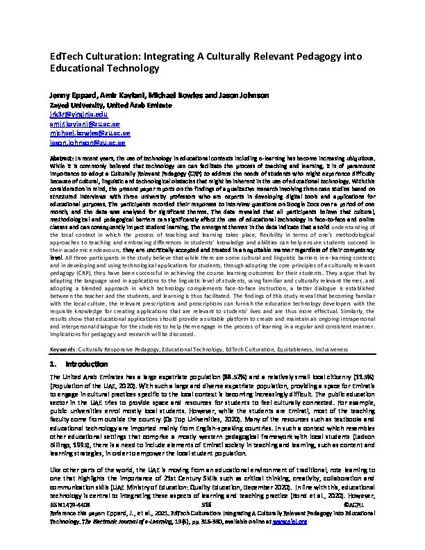
In recent years, the use of technology in educational contexts including e-learning has become increasing ubiquitous. While it is commonly believed that technology use can facilitate the process of teaching and learning, it is of paramount importance to adopt a Culturally Relevant Pedagogy (CRP) to address the needs of students who might experience difficulty because of cultural, linguistic and technological obstacles that might be inherent in the use of educational technology. With this consideration in mind, the present paper reports on the findings of a qualitative research involving three case studies based on structured interviews with three university professors who are experts in developing digital tools and applications for educational purposes. The participants recorded their responses to interview questions on Google Docs over a period of one month, and the data was analysed for significant themes. The data revealed that all participants believe that cultural, methodological and pedagogical barriers can significantly affect the use of educational technology in face-to-face and online classes and can consequently impact student learning. The emergent themes in the data indicate that a solid understanding of the local context in which the process of teaching and learning takes place, flexibility in terms of one’s methodological approaches to teaching and embracing differences in students’ knowledge and abilities can help ensure students succeed in their academic endeavours, they are uncritically accepted and treated in an equitable manner regardless of their competency level. All three participants in the study believe that while there are some cultural and linguistic barriers in e-learning contexts and in developing and using technological applications for students, through adopting the core principles of a culturally relevant pedagogy (CRP), they have been successful in achieving the course learning outcomes for their students. They argue that by adapting the language used in applications to the linguistic level of students, using familiar and culturally relevant themes, and adopting a blended approach in which technology complements face-to-face instruction, a better dialogue is established between the teacher and the students, and learning is thus facilitated. The findings of this study reveal that becoming familiar with the local culture, the relevant prescriptions and proscriptions can furnish the education technology developers with the requisite knowledge for creating applications that are relevant to students’ lives and are thus more effectual. Similarly, the results show that educational applications should provide a suitable platform to create and maintain an ongoing intrapersonal and interpersonal dialogue for the students to help them engage in the process of learning in a regular and consistent manner. Implications for pedagogy and research will be discussed.
- Culturally Responsive Pedagogy,
- Educational Technology,
- EdTech Culturation,
- Equitableness,
- Inclusiveness
Available at: http://works.bepress.com/amir-kaviani/6/